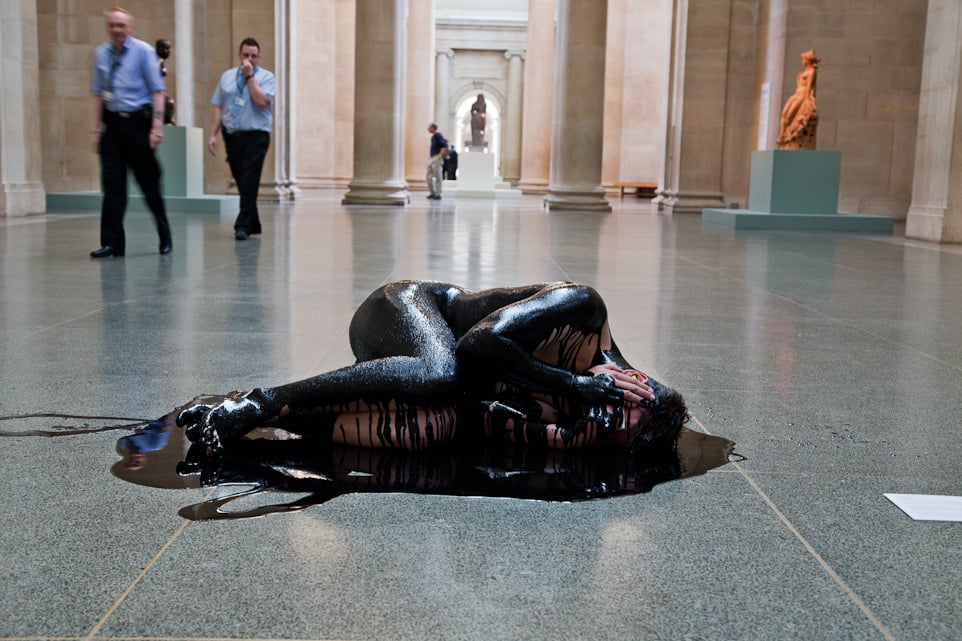
Liberate Tate's Human Cost performance inside Tate Britain
Photo: Immo Klink
Slick image
Kevin Smith asks whether we’re comfortable with companies like BP being associated with some of the most prestigious arts institutions in the country.
The 15th of May was a good and bad day for BP. On the good side, it won the 2013 Arts & Business Outstanding Arts Achievement Award for many years of outstanding arts partnerships. Unfortunately, on the same day, BP’s offices were raided by European regulators investigating allegations they had "colluded" to rig oil prices for more than a decade.
If the allegations are true, then it’s not surprising that the controversial oil giant has had the sort of profit margins that have enabled it to put millions into the arts over the years. The question is to what extent we’re comfortable with companies like this being associated with some of the most prestigious arts institutions in the country.
Point 4.1b of Tate’s Ethics Policy states that Tate will not accept funds in circumstances when: “The donor has acted, or is believed to have acted, illegally in the acquisition of funds, for example when funds are tainted through being the proceeds of criminal conduct.”
There’s already been quite a lot of criminality. In November 2012, BP agreed to pay a record $4 billion settlement for criminal charges regarding the Deepwater Horizon Disaster. It pleaded guilty to 11 felony counts relating to the deaths of the 11 workers aboard the rig, two misdemeanors, and another felony count of obstruction of Congress.
At the Tate Members AGM last December, when Serota was pressed on this particular point, he responded: “Drilling for oil, extraction of oil, is a legal enterprise. Other companies which have fallen foul of the law in terms of how they deal with people. BP have been fined, they have been found guilty. The same would be true of a building contractor where someone dies on site. Acceptance of money from that company does not violate Tate’s ethical policy.”
If BP’s convicted role in causing eleven deaths and the worse environmental disaster in North American history wasn’t criminal enough for Nick Serota and the Tate ethics committee, then surely if these price fixing allegations turn out to be true, they’ll need to reassess whether or not taking money from BP contravenes their Ethics Policy. The debate has moved on from philosophical distractions as to “all money being dirty and complicated.” Serota also admitted in the Members AGM that “Tate Trustees do draw a line… We don’t accept money from tobacco companies. We don’t accept money from arms manufacturers. We don’t accept money that has been laundered.”
If we accept the existence of ethical lines having been drawn in the past, then there is a real need to talk about redrawing them now in the context of a rapidly changing world. A world where it’s looking likely that oil companies have been engaging in systemic corruptions for decades to boost their profit margins at the expense of consumers, a world where in May we shot past the alarming milepost 400 parts per million of carbon dioxide in the atmosphere, and a world where under-funded arts organisations are being increasingly nudged towards corporate entities looking to gloss over appalling image problems.
As climate change and environmental catastrophes can often feel like abstractions far removed from the exhibitions at Tate, it’s worth creating space in the debate for those communities who are dealing with the impacts of oil companies on a daily basis. In a letter written by the representatives of Gulf Cost communities in support of Liberate Tate’s recent unsanctioned ‘All Rise’ performance of the BP trial inside Tate Modern, the signatories wrote: “While BP has been trying in court to prevent compensation payments from being made to those whose lives have been devastated by the spill, its also embarked on a massive publicity campaign to sponsor cultural and sporting events in order to convince the world what a good corporate citizen it is. Sponsorship deals with prestigious arts institutions like Tate contribute and reinforce the power-base of oil companies like BP, which in turn are able to ride roughshod over communities like ours that they have devastated. We’re convinced that the average gallery-goer in the UK would prefer that the Tate found sponsorship that wasn’t directly linked to the devastation of our ecosystems and livelihoods.”
Kevin Smith is Oil Sponsorship campaigner at Platform
@kevinjgsmith
@platformlondon
Read more on Platform's oil sponsorship campaign here
Join the Discussion
You must be logged in to post a comment.